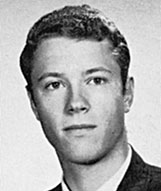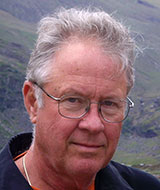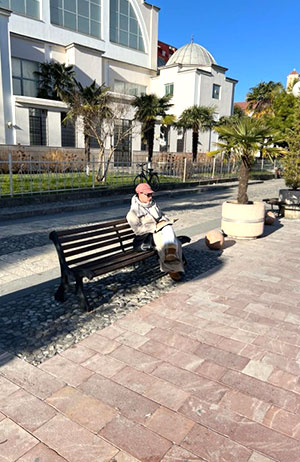In Memoriam
Joseph Brooks Carder

Brooks Carder
1964 Yale graduation
Brooks Carder died on January 10, 2024. His eldest son Bert wrote us that “the Parkinson’s he had finally won the battle.”
Brooks was a leader in applying the disciplines of quality to the improvement of safety performance. His work focused on the use of scientific assessment to enable the design and implementation of successful improvement programs. He coauthored the “Benchmarking and Performance Appraisal” chapter in ASSE’s publication, The Safety Professional’s Handbook. His education included an A.B. from Yale in 1964 and a Ph.D. in psychology from the University of Pennsylvania in 1969. He was a professional member of ASSE’s San Diego Chapter and a member of the Society’s Consultants Practice Specialty.
Below are three remembrances:
Obituary

Brooks Carder
2014 Yale reunion photo
Joseph Brooks Carder, Jr. was born in Missouri on May 4,1942 and passed away at the age of 81 years in San Marcos, CA on January 10, 2024.
He is survived by his loving wife Frances Carder and his three children, Bert Carder, Marshall Carder, and Maliq Warfield, his sister Nancy and his nephews Noah and Aaron Kivett.
In his youth, Brooks, as they called him most of his life, was very into sports. He played baseball and basketball and later found golf around the age of 12 which was a lifelong passion for him.
He was also a very bright and good student who hosted discussions during his high-school years with many of the most intellectual minds. According to his sister, he never brought a book home from school and yet managed a full ride to Yale where he graduated in 1964. He went on to earn a PhD from Penn in Physiological Psychology in 1968 and moved to Los Angeles to start his teaching career at UCLA. During his tenure at UCLA he was responsible for many important research projects and published voraciously. His works are still cited to this day, and his total number of citations is in the many thousands. He stayed at UCLA until 1975, when he began his work in the intentional community known as Synanon. He always said he left academia because business was less competitive.
He started by running the school in the community and moved into the business within a couple of years. From the position of controller, he rose to be the president and managing partner of the Association of Directors of Geriatric Academic Programs (ADGAP). During his time at ADGAP he also studied the teachings of W. Edwards Deming extensively, and became an integral part of the network surrounding him. He worked in this field until he finally retired. He was a member of the American Society for Quality and often published articles in its journal.
He lived in Del Mar, CA from 1989 until shortly before his death in 2024. He was passionate about bicycles and loved to ride the coast with his wife and friends. He was an excellent bicycle mechanic and loved to tinker with his machines, something he maintained throughout his life beginning with his love for motorcycles. He was also an adoring dog owner who found community at the local dog park during his daily outings with his pack.
Brooks will be remembered by all as a gentleman, an athlete, and a scholar. His dry and deadpan humor will be missed by those that knew him, as will his dinner parties and love for cooking. Although he suffered from Parkinson's disease for almost two decades, he fought bravely and valiantly in the face of such a curse. He did not complain or lament his fate, rather he went about his business as if nothing were amiss, which is an example for all. He also took great care of his wife until he could no longer do so, refusing to let the ravages of the disease kill his spirit.
Brooks’ celebration-of-life ceremony will be held at the Pacifica Del Mar on March 16 at 12:00pm.
Essay, 50th Reunion Book
by Brooks Carder
May 2014
If the SAT had measured emotional intelligence I never would’ve gotten into Yale. As it was I learned a great deal at Yale but it would take about another 20 years for the more important lessons to take effect. Nevertheless things worked out well. I could count a lot of things in my life today as misfortunes, such as having had Parkinson’s for nine years, having my wife paralyzed by a stroke two years ago, not being able to break 80 on the golf course anymore, and so on. But I am happier now than I have ever been. One of the important things I’ve learned is that being happy is not about what happens to you. Rather it’s about how you view the world and live your life.
The best things in my life are my wife of 30+ years, and my two sons. Fran is truly the love of my life: beautiful, a competent and successful businesswoman, and, most important, a person of great character. Though she has been confined to a wheelchair for over two years and can’t do anything without assistance, she has not given up.
My sons are a constant joy. Bert, 47, is an entrepreneur and world citizen. He has lived in Singapore for about three years and has no plans to come back to the United States soon. He has just gotten married, his second, to a lovely German woman in Singapore. Typical of Bert he decided to hold the wedding in a Tuscan villa which would be convenient to Angie’s parents, who are not world travelers. Unfortunately, with Fran’s condition, it is just too difficult for us to go there.
Marshall, 45, lives only about five miles away. After college he worked for a year, saved some money, and headed for Europe, intending to stay for a year. About five months into the trip he called me saying he was on his way to Madrid to fly to Rio, as he had met a girl. He lived with Ana in Rio for six months. They moved back to the United States and were married. During the Rio period Marshall became fluent in Brazilian Portuguese and began to learn Capoeira, the Brazilian martial art. Their daughters, Giuliana 13 and Olivia 10 are beautiful, smart, and bilingual. These days Marshall owns a company that provides healthy food for school lunches. He has advanced to the level of Professor in Capoeira, and golfs to a three.
I still do a bit of consulting in industrial safety, having developed a process that uses survey data to develop an improvement plan. I published a book on the process. In 1990 I met Dr. Edwards Deming, the quality expert who transformed manufacturing in Japan. I subscribed to his approach to business, which was basically the use of scientific knowledge and methods. These days I do a great deal of volunteer work for the American Society for Quality (ASQ) which developed from his work.
Remembering Brooks Carder, PhD: A Journey Through Mentorship, Leadership, Positive Psychology, and the Power of Education
Sidita Hasi, PhD
LinkedIn
January 31, 2024
I woke up today to an email informing me that one of my life mentors, Brooks Carder, PhD, has passed away. One of his family members thought that, as his friend, I should be aware of it and maybe I could participate at his life ceremony. I always thought of him as a guru but never thought I would have been invited to his life ceremony... I had feared receiving this news one day due to my unsuccessful attempts to get updates from him over the past year, given his battle with Parkinson's disease. In fact, his last reply was exactly one year before the day he passed away. He had only typed one letter, but at least he had responded.
I met Brooks (and I refer to him by name despite the generational differences because that's the type of leadership he exemplified — just a mere human serving others) when I first started volunteering for the ASQ Human Development and Leadership Division. At that time he held the chair role, and ever since the leadership-team meeting rooms have consistently brightened my heart and mind. I was intrigued by his role as a professor, perhaps fueled by my obsession with academia, likely influenced by my background in a post-communist country. Similar to Mandela, I also viewed education as the only weapon we can use to change the world. At least education had changed my world.
Brooks once mentioned that he was a college friend of Dr. Seligman, the father of positive psychology. I had previously been introduced to positive psychology during an office visit with Dr. Joe Albert, PhD , another mentor of mine who was serving as the chair of my Gonzaga University School of Leadership Studies. During my frequent quick visits to his office, I inquired about a big red book I had noticed on his desk. Dr. Albert then informed me about new research on positive psychology, with Dr. Seligman being its pioneer.
When, years later, I heard Brooks speak about positive psychology during our ASQ HD&L leadership meetings and witnessed how he led our division based on such principles, I connected the dots. I was on the right path, guided by the right gurus. He would end our leadership meetings by asking us to express gratitude for something from that day, and his positive energy was truly uplifting. He taught us that positive psychology was about prevention versus correction of our well-being.
His insights and vision were heartwarming to me during my transition back to my home country after 20 years away from it. Back in 2019, I had the chance to go back to the US, precisely in Houston, for a leadership meeting with the ASQ HD&L division team and finally met Brooks in person after six years of collaborating online. Seeing him in a wheelchair, yet confident and peaceful enough, sharing his enlightening wisdom for our division and society as a whole, with such ease despite his physical limitations, was eye-opening to me.
The year after, COVID hit us all, and I had the privilege, along with my co-partner at ASQ HD&L, to moderate his last webinar, "The Power of Positive Psychology," which he delivered for our division after I invited him to share his insights on positive psychology during COVID times. These were critical times that our community and beyond were going through and, for sure, we needed his insights. His speech left us speechless, mentioning a letter by George Washington which spoke about Love being central to everything. He closed his speech with the humbleness and vulnerability each leader should have, sharing his fears, emotions, and gratitude, and teaching me personally and every attendee that it's not about avoiding emotions when they seem negative but about acceptance and sitting with them. I invite everyone to listen to the full recording and fall in love with his wisdom as I did.
So, my dear humans on this seemingly cold platform, today I share with all of you that my heart is broken and that his body is released from pain. After hearing the news, I went for a walk and did the only thing that lifts me up when I'm down: education. I reflected on what inspired me about Brooks. Initially, the idea of his being a professor in San Diego had triggered my interest, and here I am today doing my own PhD in Ethical Leadership, a program initiated by another mentor of mine from my graduate studies, Dr. Tony Andenoro, PhD, feeling like these years flew by and that nothing is random if you follow the signs and connect the dots of your inner calling. I feel so grateful to have been surrounded and influenced by these great humans.

Unexpectedly, my local pharmacist friend, another intellectual who had returned to Albania after studying abroad and with whom I share my visions (and keep my intellect sane when surrounded by so much lack of it), passed by unnoticed and let me read and reflect in peace, then sent me this picture of me in those moments. Little did he know Brooks was there with me in my soul, mind, and heart. My friend texted to know what I was reading, and I shared that it was a book called The 100: A Ranking of the Most Influential Persons in History by the American author Michael H. Hart. The page I was reading in the book on this picture was about Aristotle's life and his vision that:
“The fate of empires depends on the education of youth.”
When I sent this to my pharmacist friend, he replied with a sad emoji, stating that 80% of those in our city would not even understand its meaning. Indeed, Aristotle's vision reminded me of the contradictory reality of highly corrupted Albanian public educational institutions and public institutions overall, initiating a sense of negative emotions within me. However, thoughts of what Brooks would say and do came to mind, calming me down and inspiring me to persist in my journey towards education and positive psychology because, as Mandela taught us:
“Education is the most powerful weapon which you can use to change the world”
Brooks knew how to face challenges with grace. Through gratitude, he taught me that we should resist the temptation to stop working towards our life purpose, even when feeling alone on such a path, and be thankful regardless of the circumstances. Similarly, Viktor Frankl believed that life holds meaning regardless of one's circumstances if we cling to our passion and purpose in life.
Each of us has a natural tendency towards a purpose, and it's essential to be aligned with it. Oprah's book, The Path Made Clear: Discovering Your Life's Direction and Purpose further reinforced this for me. I invite everyone to discover their personality through the Myers-Briggs personality test so that they can better align themselves with what they're meant to do.
Going back to my day today, once I stopped reading about Aristotle, I walked alone towards home, chasing the sun and hiding my tears in the uncommon narrow alleys intentionally chosen to avoid conversations, as everyone knows everyone in a small town. I wasn't ashamed to cry but preferred to be left alone with Brooks and his soul's smile. I don't know if my tears are of sadness for me and the world, having lost such a humane human, or tears of gratitude for the chance to be inspired by him and cross his path. I would say both, but prefer to respond in the second version as Brooks would want me to. But one thing I know well, and I want to promise:
Dear Brooks – your path will continue with me and all those whose lives you've impacted.
Rest in peace, my friend and guru. Thank you for enlightening my path.
Love (your favorite word from G. Washington's letter),
Sidi
PS: Grateful to Brook's son, Bert Carder, for informing and inviting me to Brook's life celebration, which unfortunately, due to relocation, I can't attend. Also, for making me feel I was to Brooks at least 1% of what he was to me. I wish the universe takes this letter of mine to Brooks and enables him to see the impact he left during his human journey.

